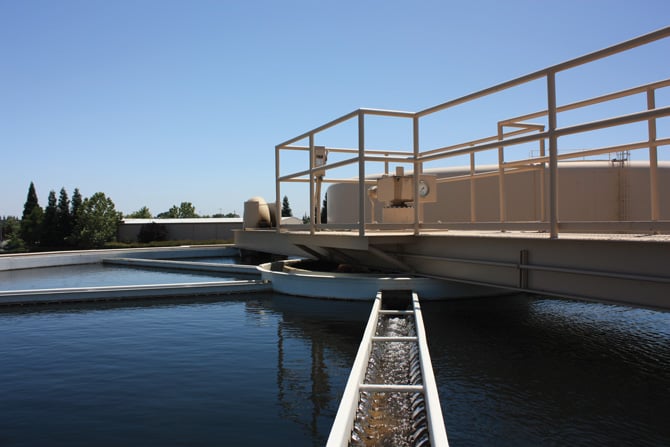American States Water Co. bolstered its second-quarter earnings, finding a silver lining in the forced sale of one of its water systems after a five-year legal battle as the company also scored major military base contracts.
The San Dimas-based parent of the Golden State Water Co. utility saw its second-quarter earnings jump 17 cents to 62 cents a share, a 36.5 percent increase as its net income rose to $22.8 million from $16.7 million in the same period a year ago.
Its operating revenue rose 1 percent to $113.2 million from $112 million in the year-earlier period, but that didn’t include the gain from its sale of the Ojai water system this spring.
That $34 million deal with the Casitas Municipal Water District ended American States’ legal battle with a group of Ojai residents and the water district, who sought to wrest control of the system from Golden State. American States booked an $8.3 million gain on the sale, translating to 13 cents a share.
“While we were not looking to sell this system, we are pleased with the terms of the settlement agreement,” Chief Executive Robert Sprowls said in a conference call with analysts a day after the Aug. 2 earnings release.
Operating revenue from Golden State’s remaining 38 water systems was actually flat at around $81 million compared with the second quarter of last year.
American States ranked No. 54 on the Business Journal’s list of largest public companies in the L.A. area based on its market capitalization of $1.74 billion as of June 30. At the close of markets Aug. 9, the company’s stock hit a 52-week high of $51.38 a share as its market cap climbed to $1.88 billion.
A handful of private water utilities around the state have faced legal challenges in recent years to put their systems in the hands of public entities.
Golden State is also fighting an eminent-domain battle with Claremont for control of the utility’s water system in that San Gabriel Valley city. In December, a court ruled in favor of Golden State’s effort to retain control of its system, but the city is appealing the decision. Appellate hearings aren’t expected to take place until early next year.
Residents in both cities have complained about high and rising water rates from Golden State; the utility has said those costs are inevitable as more money must be spent to maintain aging pipes.
Military maneuvers
Meanwhile, the water services contracting arm of American States resumed its growth after a pause of a few years, winning more business through the expansion of one 50-year contract and the addition of another 50-year contract to provide water operation and wastewater services to military bases.
Together, this new business added 5 cents to American States’ earnings per share and drove up the unit’s revenue to $25 million in the second quarter. For the 12 months ended June 30, the unit’s revenue rose to 24 percent of total company revenue, up from 22 percent for the 12 months ended June 30, 2016.
“Our contracted services business has enabled us to capitalize on our competencies in operating water systems to grow our overall business, allowed us to diversify our risk and has provided opportunities to improve companywide returns,” Sprowls said in an email.
The water contracting arm, known as American States Utility Services, was launched 20 years ago after a decision by the U.S. Department of Defense to start privatizing water and wastewater services on domestic military bases.
After several years of rapid growth during which the company won 50-year contracts to serve eight bases – including Fort Bragg, N.C., the largest military base in the nation by population – the company took a pause from growth to focus on staffing up the contracts it had already won, according to Eva Tang, American States’ chief financial officer. Tang said the decision was made two or three years ago to start expanding the business again. That strategy is starting to bear fruit.
In the first half of the year, the company won an expansion of its contract at Fort Bragg and started work on a new 50-year contract worth a cumulative $510 million at Eglin Air Force Base in northern Florida, she said. The company is bidding on new contracts at other bases and on expanded work at some of the 10 bases the company is already serving, but said she could not release further details.
PUC decisions
American States’ water systems utility, Golden State, which generates about 70 percent of the company’s revenue, faces two key decisions from the state Public Utilities Commission: its general rate case for 2019 through 2021 as well as a separate rate-of-return proceeding for those same years.
On the general rate case, Golden State last month filed for an overall utilitywide average rate increase of 10.5 percent for those three years over current rates. It is also seeking a 9.1 percent rate of return on its capital investment.
Denise Kruger, senior vice president of regulated utilities for Golden State, said the increase was due to two factors: aging pipes that need increased maintenance and rising water procurement costs. Golden State buys roughly one-third of its water from outside sources while the rest comes from wells it owns.
One analyst who tracks several California water utilities said there’s a good chance that the PUC won’t grant all of those increases. Specifically, he cited a PUC Office of Ratepayer Advocate’s recommendation that Golden State and three other water utilities only receive a return on capital of 8.2 percent to 8.3 percent.
“An adopted equity ratio and cost of debt similar to ORA’s recommendation would present incremental headwinds for (American States’) 2018 EPS growth,” Jonathan Reeder, an analyst with Wells Fargo Securities in New York, wrote in his most recent research report on American States.
But in subsequent comments, Reeder said Golden State is better positioned to handle such a setback because it has kept operating costs in check.

